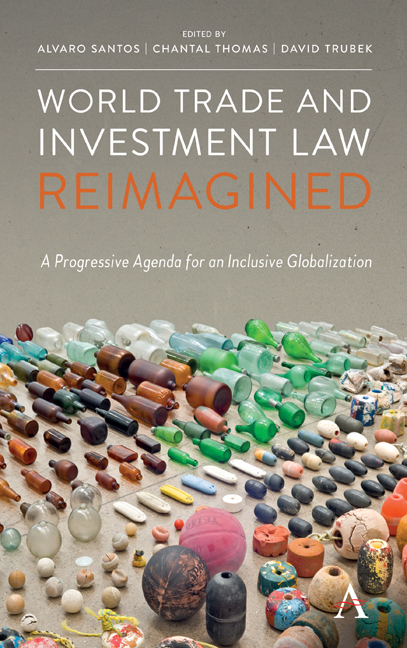Book contents
- Frontmatter
- Contents
- Acknowledgments
- List of Contributors
- Introduction World Trade and Investment Law in a Time of Crisis: Distribution, Development and Social Protection
- PART I RETHINKING THE POLITICAL ECONOMY OF TRADE: COMMENTS ON DANI RODRIK'S STRAIGHT TALK ON TRADE
- PART II SETTING THE STAGE FOR A PROGRESSIVE VISION: EMERGING ISSUES IN WORLD TRADE AND INVESTMENT LAW
- SECTION 1 MAPPING THE NEW CONTEXT FOR TRADE AND INVESTMENT LAW
- Chapter Six The End of Trade and Investment Law as We Know It: From Singularity to Pluralism
- Chapter Seven Heterodox Market Orders in the Global Trade System
- Chapter Eight Embedded Neoliberalism and Its Discontents: The Uncertain Future of Trade and Investment Law
- Chapter Nine Rethinking the RCEP in the Third Regionalism: Paradigm Shifts in World Trade Law?
- Chapter Ten Beyond Normal Trade Law?
- SECTION 2 DEALING WITH MAJOR CHANGES IN THE WORLD ECONOMY
- SECTION 3 FRAMING A MORE EQUITABLE INVESTMENT LAW REGIME
- SECTION 4 SUPPORTING DEVELOPMENT
- SECTION 5 REINFORCING SOCIAL PROTECTION: SPREADING THE BENEFITS OF TRADE, DEALING WITH LOSSES AND EXPLORING THE TRADE–IMMIGRATION NEXUS
- Index
Chapter Ten - Beyond Normal Trade Law?
from SECTION 1 - MAPPING THE NEW CONTEXT FOR TRADE AND INVESTMENT LAW
Published online by Cambridge University Press: 07 September 2019
- Frontmatter
- Contents
- Acknowledgments
- List of Contributors
- Introduction World Trade and Investment Law in a Time of Crisis: Distribution, Development and Social Protection
- PART I RETHINKING THE POLITICAL ECONOMY OF TRADE: COMMENTS ON DANI RODRIK'S STRAIGHT TALK ON TRADE
- PART II SETTING THE STAGE FOR A PROGRESSIVE VISION: EMERGING ISSUES IN WORLD TRADE AND INVESTMENT LAW
- SECTION 1 MAPPING THE NEW CONTEXT FOR TRADE AND INVESTMENT LAW
- Chapter Six The End of Trade and Investment Law as We Know It: From Singularity to Pluralism
- Chapter Seven Heterodox Market Orders in the Global Trade System
- Chapter Eight Embedded Neoliberalism and Its Discontents: The Uncertain Future of Trade and Investment Law
- Chapter Nine Rethinking the RCEP in the Third Regionalism: Paradigm Shifts in World Trade Law?
- Chapter Ten Beyond Normal Trade Law?
- SECTION 2 DEALING WITH MAJOR CHANGES IN THE WORLD ECONOMY
- SECTION 3 FRAMING A MORE EQUITABLE INVESTMENT LAW REGIME
- SECTION 4 SUPPORTING DEVELOPMENT
- SECTION 5 REINFORCING SOCIAL PROTECTION: SPREADING THE BENEFITS OF TRADE, DEALING WITH LOSSES AND EXPLORING THE TRADE–IMMIGRATION NEXUS
- Index
Summary
What is normal trade law? The completion of the Uruguay Round in 1994 and the establishment of the World Trade Organization (WTO) seemed to mark the achievement of normal trade law, both in the sense of normalizing regulation of international trade relations by legal norms and institutions and in the sense of a normal content of trade law involving significant international convergence rather than sovereign diversity. Both of these senses of normal trade law now seem to be under pressure. The stalemate at the WTO, the turn to preferential agreements and the more recent return of belligerent sovereign unilateralism all suggest the need to interrogate again the legal context in which global trade and investment is embedded. Going forward, trade law may need to emphasize less convergent substantive concepts such as exceptions, differential treatment, interface and variable geometry. But this may also be the moment to rethink whether normal trade law involves a return to a more open role for international politics (including negotiation, threats and conflict), as well as a normal role for law better understood through the frames of transnational law and legal pluralism.
The Concept of Normal Trade
Defining normal trade in international economic relations was clearly a contested and negotiated task during the era of the General Agreement on Tariffs and Trade (GATT), with relatively thin international-level trade regulation combined with plural varieties of domestic market regulation, including in socialist states. The contested nature of normal trade was strikingly exemplified by US– China trade relations before 2000, which were significantly framed around the annual political maneuvering to grant the presidential waiver that would allow for the formal status of normal trade relations with China under US trade law. Normal trade relations involved the continuation of the most-favored-nation (MFN) treatment already extended by the United States to most of its trading partners, including all of the WTO– GATT membership. A major change in the character of the trade relationship between two distinct national economies therefore was marked when Congress passed legislation to grant China permanent normal trade relations (PNTR) in anticipation of the accession of China to the WTO in 2001. Similarly, Russia gained PNTR in 2012.
- Type
- Chapter
- Information
- World Trade and Investment Law ReimaginedA Progressive Agenda for an Inclusive Globalization, pp. 107 - 118Publisher: Anthem PressPrint publication year: 2019



